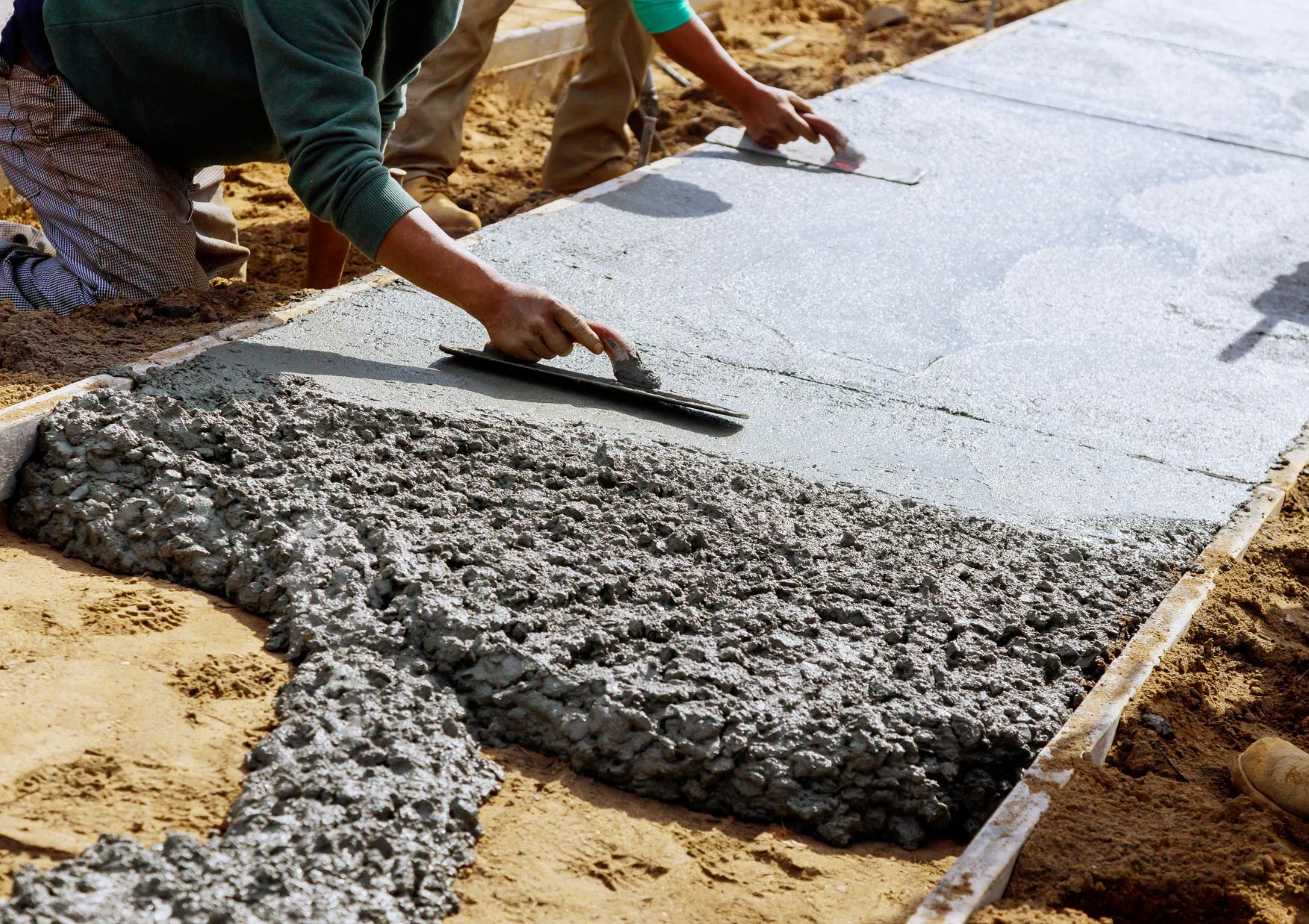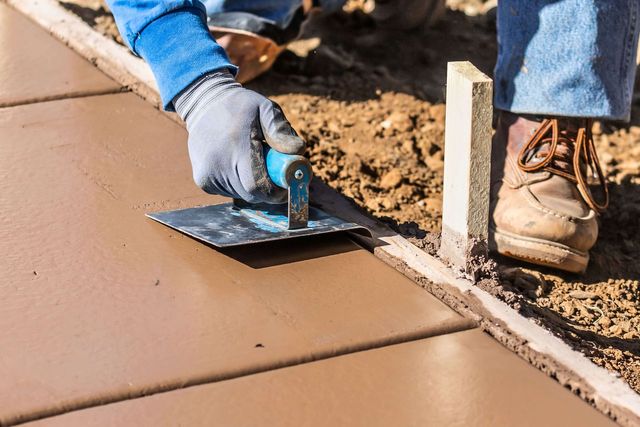
Recognizing the Vital Function of a Concrete Professional in Modern Building And Construction and Style
Concrete contractors are necessary to the building and style industries. Their experience warranties that structures are not just long lasting however likewise cosmetically pleasing. They involve in various responsibilities, from project preparing to top quality control, and team up with engineers and architects. With advancing trends and modern technologies, their role is more essential than ever. Comprehending their effect can reveal understandings into contemporary building techniques and the future of structure design.
The Significance of Concrete in Building and construction
Numerous materials are utilized in construction, concrete stays a keystone of modern-day structure practices due to its toughness, strength, and convenience. This composite product, made from concrete, water, and aggregates, can hold up against substantial tension and is immune to fire, weather, and insects, making it excellent for varied applications. Concrete's flexibility allows it to be formed into different shapes and dimensions, promoting ingenious building layouts.
Its thermal mass homes contribute to energy efficiency, helping to regulate indoor temperatures. The extensive availability of basic materials and the reasonably low expense of concrete likewise boost its charm for large-scale projects, from commercial structures to facilities like roadways and bridges. As urbanization remains to climb, the need for trustworthy and sustainable structure materials strengthens concrete's vital role in building and construction, making it a fundamental selection for building contractors and architects going for long life and strength in their projects.
Secret Obligations of a Concrete Specialist
Concrete specialists play a crucial duty in the construction procedure, with several crucial duties that guarantee job success. Their jobs include task preparation and design, material option and administration, in addition to preserving quality assurance and guarantee throughout the project lifecycle. Recognizing these obligations is important for valuing the specialist's effect on construction results.
Project Preparation and Style
When beginning on a building and construction task, effective job planning and layout play an important role in a concrete service provider's duties. The contractor has to collaborate very closely with customers, architects, and engineers to comprehend the job's requirements and objectives. This entails assessing site problems, assessing style requirements, and figuring out the extent of work. A concrete specialist is likewise in charge of creating budgets and timelines, guaranteeing that all stages of the task align with overall goals. Furthermore, they need to expect possible obstacles and design options to keep project efficiency. By carefully creating each facet and planning of the concrete work, the contractor sets the structure for effective execution, guaranteeing architectural integrity and adherence to security requirements throughout the construction procedure.
Material Option and Administration
Effective material selection and management are important duties for a concrete professional, as these choices directly impact the high quality and durability of the last structure. Concrete specialists have to examine numerous materials, including aggregates, admixtures, and reinforcement types, to ensure they meet task specifications and ecological conditions. They have to think about factors such as resistance, workability, and toughness to weathering. In addition, handling the supply chain is crucial, as timely delivery of materials can remarkably influence project timelines. Service providers should maintain connections with providers to secure premium resources while also monitoring stock levels to avoid excesses or lacks. Ultimately, this cautious choice and monitoring of materials contribute to the overall success of construction projects and the long life of the frameworks constructed.
Quality Assurance and Guarantee
Quality assurance and assurance are critical in the construction sector, specifically for concrete specialists tasked with delivering resilient and dependable frameworks. Concrete contractors must carry out rigorous quality control steps throughout the building process, ensuring that all products fulfill specified requirements and guidelines (TJ Concrete Contractor). This includes keeping track of the mixing, putting, and treating procedures to avoid defects and boost structural honesty. Routine examinations are essential, allowing professionals to determine and rectify issues without delay. Furthermore, concrete professionals frequently team up with engineers and engineers to guarantee that the end product aligns with layout specifications. By sticking to rigid high quality guarantee methods, concrete service providers not just secure the longevity of their job but likewise promote the count on of customers and stakeholders in the construction sector
Types of Projects Managed by Concrete Service Providers
Concrete contractors are often associated with massive building and construction projects, their experience prolongs to a varied array of applications. These professionals are integral to property jobs, such as driveways, structures, and patio areas, ensuring toughness and aesthetic allure. In industrial building and construction, they add to the creation of floors, sidewalks, and structural elements that satisfy particular style and safety and security criteria.
Furthermore, concrete professionals are involved in infrastructure jobs, including passages, bridges, and roads, where their abilities assure architectural honesty and durability. They also play a critical role in attractive concrete applications, such as stamped concrete and refined surface areas, which improve the aesthetic aspect of various areas. Furthermore, their solutions encompass fix and upkeep work, addressing problems like cracking or disintegration in existing frameworks. This flexibility highlights the crucial role concrete service providers play in both attractive and functional aspects of modern-day building and construction and design.
Skills and Credentials Needed
Concrete service providers must possess a varied collection of qualifications and abilities to properly handle the series of projects they take on. Effectiveness in concrete blending, putting, and ending up is necessary, as is a solid understanding of different sorts of concrete, including reinforced and attractive alternatives. Understanding of building techniques, blueprints, and job administration concepts is vital for effective implementation.
Physical stamina and strength are vital due to the requiring nature of the work. Contractors need to likewise have solid analytic abilities to attend to unexpected challenges during jobs. Communication skills are essential for collaborating with clients, architects, and other tradespeople.
In addition, acquiring appropriate accreditations can boost a professional's integrity and increase their career opportunities. Continual education and learning in brand-new strategies and products maintains professionals competitive in a rapidly evolving market. These skills and certifications jointly make it possible for concrete contractors to supply premium results successfully and effectively.
The Role of Concrete Service Providers in Safety And Security Conformity
Making certain security compliance is an essential responsibility of concrete service providers, as they navigate the complexities of building and construction websites. These professionals are entrusted with adhering to strict security guidelines and criteria, which are important for avoiding accidents and making certain the well-being of all website workers. Concrete Contractor Near Me. Concrete professionals have to carry out comprehensive safety and security plans that consist of training personnel on appropriate tools usage and safety and security methods
Furthermore, they are accountable for inspecting products and work procedures to identify possible threats. By conducting normal safety and security audits and threat assessments, concrete service providers can proactively address problems prior to they intensify. They work together with various other construction specialists, such as designers and task managers, to integrate safety and security actions right into the total job technique. Inevitably, the commitment of concrete service providers to security compliance not only secures employees but likewise enhances job efficiency and high quality, reinforcing their vital role in modern-day construction.
Patterns and Developments in Concrete Layout
Current improvements in concrete design have introduced a variety of trends and innovations that focus on sustainability and looks. Lasting concrete options, decorative ending up techniques, and smart concrete innovations are reshaping the industry. These growths not only boost architectural integrity but likewise contribute to eco liable building and construction practices.
Sustainable Concrete Solutions
As the building and construction industry progressively focuses on sustainability, innovative concrete solutions are arising to minimize environmental impact while boosting efficiency. One famous fad is the use of recycled materials, such as crushed concrete and commercial by-products, which not only reduces waste however additionally improves the concrete's residential or commercial properties. Moreover, advancements in admixtures, consisting of fly ash and slag, add to decreased carbon exhausts throughout manufacturing. Another considerable innovation includes the development of permeable concrete, which enables water to flow through and decreases runoff, mitigating flooding and groundwater depletion. Additionally, the surge of carbon capture technologies in concrete manufacturing holds pledge for more emissions reduction. These sustainable concrete solutions exhibit the industry's dedication to environmentally accountable building and construction practices.

Ornamental Completing Methods
A plethora of attractive finishing methods have actually arised in concrete layout, changing plain surfaces right into visually striking elements. Techniques such as stamping, staining, and brightening enable a variety of aesthetic possibilities, satisfying varied style preferences. Stamped concrete mimics all-natural materials like rock and block, while tarnishing presents dynamic colors that boost the surface area's charm. Sleek concrete, known for its streamlined finish, adds refinement to both industrial and domestic spaces. Additionally, microtopping and overlay systems supply ingenious alternatives for rejuvenating existing concrete. These strategies not only enhance the aesthetic qualities yet also boost toughness and maintenance. As trends advance, the assimilation of attractive finishes continues to play a vital role in modern construction, marrying performance with creative expression.

Smart Concrete Technologies
While standard concrete continues to be a staple in construction, the emergence of wise concrete innovations is revolutionizing the market by incorporating advanced functions that enhance efficiency and sustainability. These developments consist of self-healing concrete, which makes use of ingrained bacteria that activate upon splitting, and sensor-equipped concrete that keeps an eye on structural health in real-time. Furthermore, piezoelectric and thermochromic concrete can adapt to ecological adjustments and generate electrical power, specifically. The application of recycled materials and environmentally friendly additives additionally adds to minimizing the carbon footprint of concrete manufacturing. As these modern technologies proceed to evolve, they guarantee to improve durability, lower maintenance prices, and advertise greener building methods, making them essential for future building tasks. The duty of concrete service providers is increasingly significant in harnessing these improvements.
Regularly Asked Concerns
What Elements Impact Concrete Prices in Building Jobs?
Concrete prices in building and construction jobs is influenced by product prices, labor expenses, project size, area, availability of resources, and market demand. Seasonal aspects and transport expenses can additionally greatly influence the overall prices framework.
How Do Climate Condition Influence Concrete Work?
Weather substantially affect concrete work; extreme temperature levels, humidity, and rainfall can affect establishing times, healing processes, and total top quality - Concrete Contractor Near Me. Service providers should adapt their approaches and timetables to minimize these environmental impacts for effective project completion
What Is the Normal Timeline for a Concrete Task?
A common concrete job timeline ranges from a few days to a number of weeks. Elements influencing this period include job dimension, intricacy, weather, and treating times, which collectively figure out the general conclusion timetable.
Can Concrete Professionals Aid With Layout Consultations?
Concrete professionals can undoubtedly help with design appointments, giving important understandings on material choice, structural honesty, and visual alternatives, making certain that jobs fulfill both useful requirements and the client's vision for the completed product.
What Prevail Mistaken Beliefs Regarding Concrete Resilience?
Common mistaken beliefs about concrete durability consist of the belief that it is unsusceptible harm read more which all kinds are just as strong. Actually, factors like mix style, environmental problems, and upkeep substantially influence concrete's long-lasting efficiency.
They additionally play an essential role in decorative concrete applications, such as stamped concrete and sleek surfaces, which enhance the aesthetic aspect of different rooms. Efficiency in concrete mixing, putting, and ending up is vital, as is a strong understanding of different types of concrete, consisting of strengthened and attractive options. One noticeable trend is the usage of recycled products, such as crushed concrete and industrial results, which not only lowers waste but additionally boosts the concrete's buildings. While standard concrete continues to be a staple in building, the appearance of clever concrete modern technologies is revolutionizing the sector by incorporating sophisticated functions that improve performance and sustainability. These advancements include self-healing concrete, which makes use of embedded bacteria that trigger upon fracturing, and sensor-equipped concrete that keeps an eye on structural wellness in real-time.